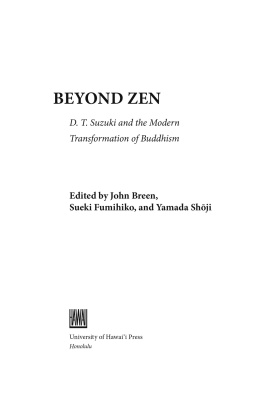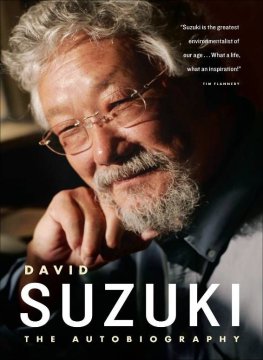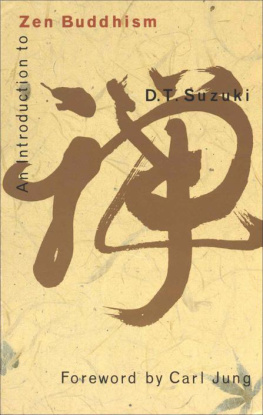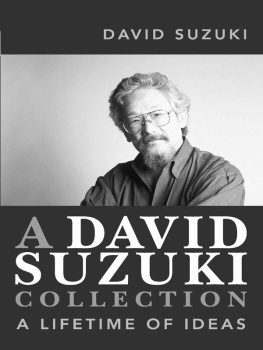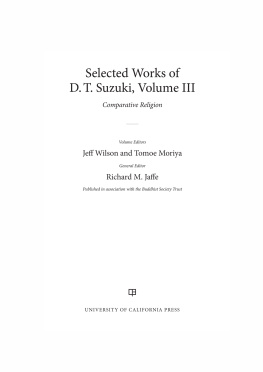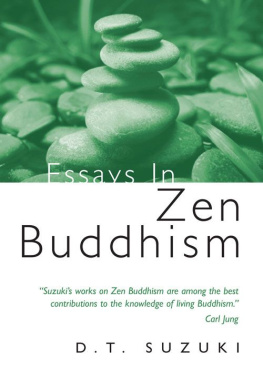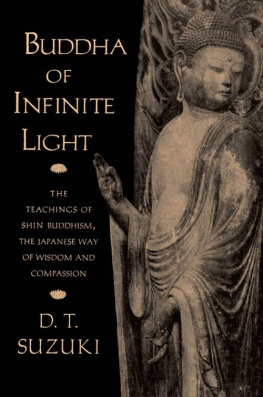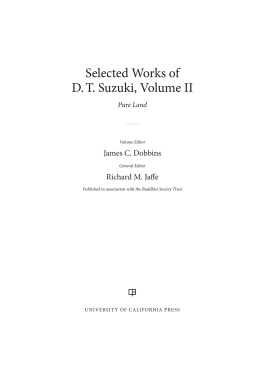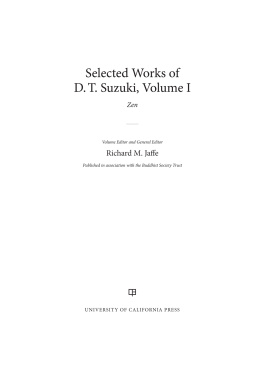Sommaire
Pagination de l'dition papier
Guide
2022 University of Hawaii Press
All rights reserved
Printed in the United States of America
First printing, 2022
Library of Congress Cataloging-in-Publication Data
Names: Breen, John, editor. | Sueki, Fumihiko, editor. | Yamada,
Shji, editor.
Title: Beyond Zen : D. T. Suzuki and the modern transformation of Buddhism /
edited by John Breen, Sueki Fumihiko, and Yamada Shji.
Description: Honolulu : University of Hawaii Press, 2022. | Includes
bibliographical references and index.
Identifiers: LCCN 2022034984 | ISBN 9780824890117 (hardback) | ISBN
9780824892210 (pdf) | ISBN 9780824892227 (epub) | ISBN 9780824893736
(kindle edition)
Subjects: LCSH: Suzuki, Daisetz Teitaro, 18701966Influence. | Buddhist
ScholarsJapan. | BuddhismJapan.
Classification: LCC BQ988.U887 B49 2022 | DDC 294.30952dc23/eng/20220808
LC record available at https://lccn.loc.gov/2022034984
Cover art: Koka Kola, 2019. Japanese cypress, gold leaf, ceramic. H560 W310 D200 mm. Kanji Hasegawa, courtesy KANA KAWANISHI GALLERY
Cover design: Melissa Rose Wong
University of Hawaii Press books are printed on
acid-free paper and meet the guidelines for permanence
and durability of the Council on Library Resources.
This digital document has been produced by Nord Compo.
Preface
JOHN BREEN
By pretty much any measure, D. T. Suzuki (18701966) was a great man. He had an abundance of charisma, and charmed audiences in Japan and the West throughout his long and eventful life. He was a prolific writer, speaker, and translator, and his books, essays, and lectures have exerted a profound and enduring impact on the way Westerners, especially, came to view not only Zen and Mahyna Buddhism but Japanese culture also. Suzukis output was at times difficult. This was a consequence of his positioning himself on the borders between Zen and Pure Land Buddhism, priest and layperson, scholar and popularizer, Japan and America, and, of course, the Japanese and English languages. His work was controversial, too. Scholars of the late twentieth and early twenty-first centuries have raised awkward questions about the political sympathies of this man of peace.
Suzuki died in 1966 at the age of ninety-five, having lived in Japan and the United States through one of the most tumultuous periods in world history. Academic and more popular interest in his work continues unabated to this day. What has been missing till now, however, is a comprehensive assessment and contextualization of his life and legacy. Now seems the perfect moment for reflection and taking stock. The fiftieth anniversary of his death has just passed; the copyright on his literary output has now expired; and his selected works have recently been published by a major American university press. We are in a position to know and to understand more than ever about Suzukis intellectual and practical engagement with religion, philosophy, and culture. This volumes editors took an important first step by hosting an international conference on Suzuki at the International Research Center for Japanese Studies (Nichibunken) in 2016. Reflections on D. T. Suzuki: Commemorating the 50th Anniversary of His Death was the first time the leading Suzuki scholars had gathered in one place to reflect critically on the man and his legacy. Scholars, both seasoned and young, Anglophone and Japanese, came to Nichibunken from America, Australasia, and Europe, as well as from across Japan to engage in a two-day exchange of scholarly views. The present volume had its beginnings in that event.
Unfortunately, it did not in the end prove possible to represent here all those Suzuki experts who presented papers at the 2016 conference. The editors would like to take this opportunity to thank the following for their contributions: professors Stefan Grace (Taish University), who expertly summed up the achievements of the two-day conference; Iwamoto Akemi (D. T. Suzuki Museum), who spoke on Daisetsus Zen, Mahyna Buddhist Thought, and the Doctrine of Early Indian Yogcra; Moriya Tomoe (Hannan University), who offered An Analysis of D. T. Suzukis Subjective Discourses on Religion and Their Relation to Social Criticism; and Wayne Yokoyama (Hanazono University), who addressed the topic of Suzukis Work on Saichis Poems: Another Lifework left Incomplete.
Sueki Fumihiko wrote the bulk of the introduction to this volume, which develops reflections on Suzuki, his life, and his work that Sueki shared at the conference and published subsequently in the journal the Eastern Buddhist. Suekis chapter, How to Read D. T. Suzuki? The Notion of Person, is a reworking of parts 4 and 5 of that essay. It is reproduced here with permission from the editor of the Eastern Buddhist. Note that the essays by John Breen and Yamada Shji are not full-length chapters but brief columns of the sort that are increasingly fashionable in Japanese publications. Finally, as is well known, Suzuki styled himself in multiple ways: D. T. Suzuki, Suzuki Daisetsu (Daisetz), Suzuki Daisetsu (Daisetz) Teitar, and Suzuki Teitar Daisetsu (Daisetz). We have not sought to impose uniformity here, and so Suzuki appears in this book under a wide variety of names.
This book adheres to established convention in using the modified Hepburn system of romanization for Japanese, and Pinyin for Chinese. Japanese and Chinese personal names are presented in the customary fashion, so that family name is followed by given name. Macrons indicating long vowels have been employed throughout, except in the case of well-known place names such as Tokyo, Kyoto, and Osaka. Finally, the editors would like to thank Kurita Hidehiko for his help with the footnotes, references, and index.
Notes
.For details of the event, see John Breen, Reflections on D. T. Suzuki, Eastern Buddhist (New Series) 47, no. 2 (2016): 101106.
.See Sueki Fumihiko, Reading D. T. Suzuki with a Focus on His Notion of Person, Eastern Buddhist (New Series) 47, no. 2 (2016): 126. The editors of this volume would like to thank the editor of Eastern Buddhist for permission to reproduce material here.
Abbreviations
BA: | Bakhmeteff Archive |
MBA: | Matsugaoka Bunko Archive |
MBKN: | Matsugaoka Bunko kenky nenp |
MECW: | Karl Marx and Friedrich Engels, Marx-Engels Collected Works, 50 vols. (New York: International Publishers, 1975) |
OMB: | Suzuki Daisetz Teitaro, Outlines of Mahyna Buddhism (London: Luzac, 1907) |
RAC: | Rockefeller Archive Center |
SB: | Akamatsu Tesshin and Fukushima Hirotaka, eds., Shin bukky, 4 vols. (Kyoto: Nagata Bunshd, 1982) |
SDS: | Suzuki Daisetsu, Suzuki Daisetsu sensh , 26 vols. (13 + 8 [zoku] + 5 [tuikan]). Tokyo: Shunjsha, 19521958. |
SDZa: | Suzuki Daisetsu, Suzuki Daisetsu zensh, 32 vols. (Tokyo: Iwanami Shoten, 19681971; 19801983) |
SDZb: | Suzuki Daisetsu, Suzuki Daisetsu zensh: Zho shinban, 40 vols., edited by Hisamatsu Shinichi, Yamaguchi Susumu, and Furuta Shkin (Tokyo: Iwanami Shoten, 19992003) |
SMC: | Sano Manabu, Sano Manabu chosakush, 5 vols. (Tokyo: Sano Manabu Chosakush Kankkai, 1958) |
SSR: | D. T. Suzuki, |

